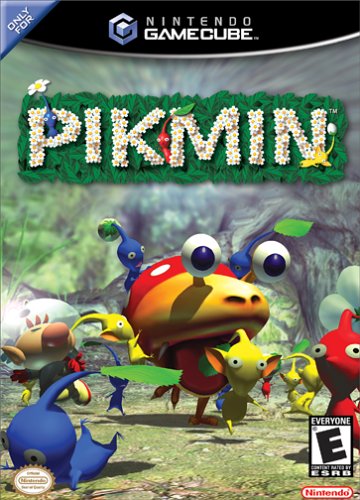
 |
 |
 |
 |
 |
 |
 |
|---|

|
|---|
Developed by: Nintendo | Published by: Nintendo | Played: 1/25/02
+
Miyamoto continues to make things not as they seem - It looks like a log, but it's really an unfoldable bridge, it looks like a sunflower, but it's really a powerup that produces more Pikmin when fed to the onion; it looks like an empty plain, but there really a bird underground waiting to snap at you. The whole game takes place on an alien planet, so there's a lot of room to discover a world where things work in a very different way. It can also really tap into the player's imagination. You might even say that Miyamoto is like one of those Disney Imagineers.
Strategic and reactive gameplay are seamlessly integrated. For example, approaching the clam, you have to throw the Pikmin into it, and them get them out at the right time before it snaps. There is a simple queue list of actions for the player to perform, and each list is different for each enemy. There's also strategy in maneuvering across the map and taking out obstacles. There also exploration and army-building in the gameplay. It's a robust package.
The originality of the game is amazing. It was Imagineered very well.
Nintendo, as always, does an excellent job of tapping into the player's simple, child-like emotions. The cute characters, the landscape design, art direction, sound and music, etc.
The levels are not too big and not too small. Never too much walking, and seldomly not enough room.
The concept of working together with these Pikmin to collect lost spaceship parts to get home to safety presents a social dynamic just about everyone can relate to - working together with others to overcome obstacles.
-
The abilities don't make the player feel powerful enough. In many of Nintendo's successful franchises, players can grow big, shoot fire and lightning, fly, swing swords, save girls, battle rivals, and other empowering and fun things. In this game you command an army of vegetable creatures and work together with them to kill other vegetable creatures and collect lost spaceship parts. It isn't quite as interesting.
The gameplay requires a lot of tedious maintenance - loosing Pikmin here and there and having to go find them and pick them up, readjusting the camera all the time, and so on.
Time limits, I think, are generally good to use at certain parts of the game where you want the player to feel hurried and preasured. However, when used throughout the entire game, it gives a sustained feeling of being rushed, and makes playing the game not as fun. It's especially detrimental in a game with a lot of exploration and army-building. All those twenty minutes I spent exploring and building up my Pikmin army were to waste because I wasn't able to retrieve a part, and I have to start all over again.
The game does a great job of tapping into the player's child-like surface-level emotions, but fails to go any deeper. By not including techniques to evoke more sophisticated and deeper emotions they are limiting their market base.
The story is way too simple. It really lacks depth. There are some games in which repairing a space ship would be just one mission, but in this case it spans the length of the entire game. Plus the relationship with your Pikmin doesn't really grow or change at all.